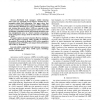Free Online Productivity Tools
i2Speak
i2Symbol
i2OCR
iTex2Img
iWeb2Print
iWeb2Shot
i2Type
iPdf2Split
iPdf2Merge
i2Bopomofo
i2Arabic
i2Style
i2Image
i2PDF
iLatex2Rtf
Sci2ools
IAT
2010
IEEE
2010
IEEE
Using Negotiation to Reduce Redundant Autonomous Mobile Program Movements
Distributed load managers exhibit thrashing where tasks are repeatedly moved between locations due to incomplete global load information. This paper shows that systems of Autonomous Mobile Programs (AMPs) exhibit the same behaviour, identifying two types of redundant movement and terming them greedy effects. AMPs are unusual in that, in place of some external load management system, each AMP periodically recalculates network and program parameters and may independently move to a better execution environment. Load management emerges from the behaviour of collections of AMPs. The paper explores the extent of greedy effects by simulation, and then proposes negotiating AMPs (NAMPs) to ameliorate the problem. We present the design of AMPs with a competitive negotiation scheme (cNAMPs), and compare their performance with AMPs by simulation. Keywords-mobile computation; load balancing; autonomous mobile program; greedy effect; mobile agent; scheduling; workflow management.
| Added | 11 Feb 2011 |
| Updated | 11 Feb 2011 |
| Type | Journal |
| Year | 2010 |
| Where | IAT |
| Authors | Natalia Chechina, Peter King, Phil Trinder |
Comments (0)

